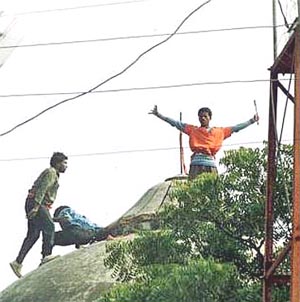New Delhi, May 20: With the Bharatiya Janata Party (BJP) getting majority in the Lok Sabha on its own, the Rashtriya Swayamsevak Sangh (RSS) now wants the party to take up its key issues - Ram temple in Ayodhya and Article 370 that had to be abandoned in the past - once again.
RSS ideologue M.G. Vaidya has made these suggestions in his latest blog. He writes that the BJP had to compromise with its ideology in 1999 in the wake of its tie-up with parties such as National Conference to reach at a unanimous common minimum programme for the National Democratic Alliance (NDA) government.
However, there is no such compulsion after the BJP gaining majority its own and its pre-poll allies such as Telugu Desam Party (TDP), Shiv Sena, Shiromani Akali Dal (SAD) and some Tamil Nadu-based parties should not have a problem, Vaidya writes in his Marathi blog Bhaashya. "In 1999, BJP could manage to get 182 seats and they needed support of 90 MPs from outside from parties like National Conference. So the common minimum programme had to be made with such parties and that became manifesto of the government. So the issues like Article 370 and construction of Ram Mandir in Ayodhya needed to be kept aside," the veteran writes.
"Now BJP had pre-poll alliance with TDP, Shiv Sena, Akali Dal and some parties in Tamil Nadu, so I don't think that they will have any problem with issues like Ram Mandir and Article 370. Though the alliance had projected issues of transparent government and development, Ram Mandir and Article 370 were part of the manifesto," he writes.
Vaidya says the BJP has got 282 seats now, which is 10 more than the required majority and the NDA has got 336 seats, if the party fulfils its promise of Ram Mandir and Article 370 without disturbing the Constitution and law, its partners should not have any issue, he opines.
The RSS ideologue goes on to target parties such as Trinamool Congress (TMC) and DMK for their regional bias and says Congress should be revived in these states for the "betterment of democracy".
"... Trinamool Congress in West Bengal and DMK in Tamil Nadu will only think about their states and they do not have any thoughts about foreign policy, especially regarding Bangladesh and Sri Lanka. So Congress's young leaders should come together and think about their defeat and there should be a change in organisational set up in Congress by allowing young leadership to prosper and come forward," Vaidya writes.
He goes on to credit RSS for BJP's thumping victory by playing an "important role in increasing vote percentage". At the same time, he says, the anti-BJP parties that bashed up the parent organisation of the saffron party in the run up to the general elections played "an equally important role".





Comments
Add new comment